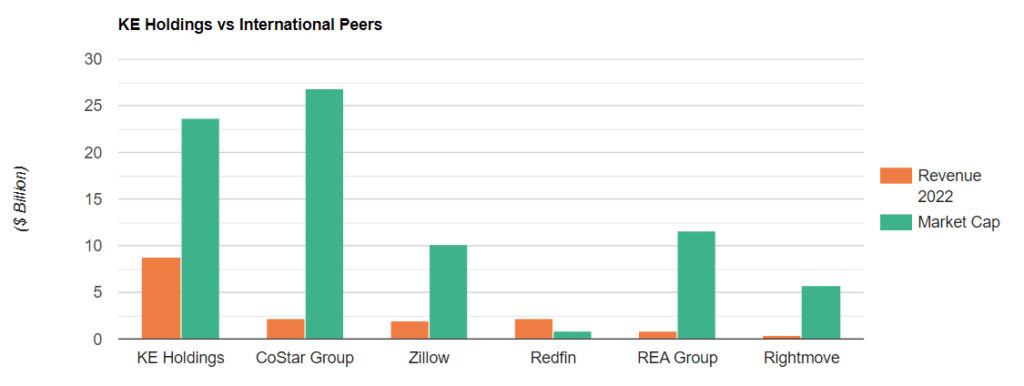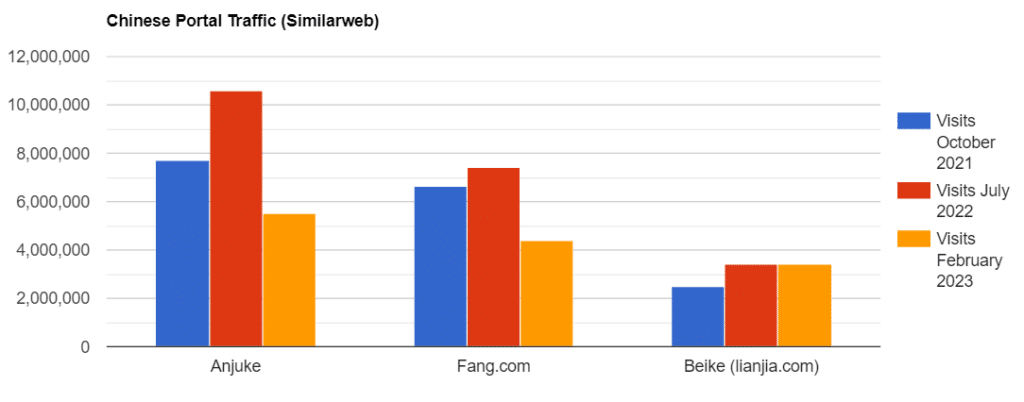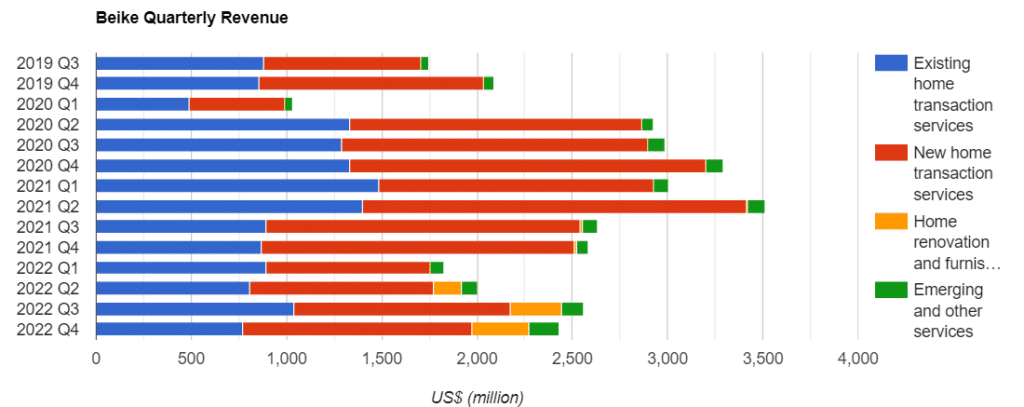
Imagine a real estate marketplace company that...
KE Holdings (aka Beike) might have a pretty uninspiring name and might have been suffering some pretty big losses of late but it's worth paying attention to for anyone working in real estate.
Founded as Homelink in 2001 the company was initially a local brokerage in Beijing. The business had early success operating a full-service model and was renamed Lianjia in 2015.
It differentiated itself from cheap, low-commission rivals and, in a market where agents rarely get exclusive mandates, offered guaranteed sales for those willing to entrust their property on an exclusive basis.
From 2010 to 2014 the company took to the internet in a big way and then expanded nationwide from 2015 to 2018 culminating in the launch of the popular online Beike platform in 2018. KE Holdings is the name of the Cayman Islands-incorporated holding company set up in the same year and the name the company uses on the stock market.
Before listing on the NYSE in 2020 and raising $2.4 billion in the process, KE Holdings had attracted investment from the likes of Tencent, SoftBank, Sequoia and Baidu among others.
Beike is the largest specialist real estate marketplace operator in the world by revenue and the second largest by market cap, just behind U.S. giant CoStar.

Domestically the company's closest competitor in terms of business model is probably FangDD which operates a similar open transaction platform. The scale of the two platforms isn't a close-run thing though. In 2022 the Gross Transaction Volume (GTV) reported by FangDD was $3.3 billion, a figure which was dwarfed by the $378 billion reported by Beike.
The only metric where Beike is playing catch-up is in traffic (although for a transaction platform and brokerage, it might not be the most relevant one). It is behind 58.com's Anjuke and Fang.com but the gap is getting smaller every time we check Similarweb's stats.

The closest analogy we can think of is U.S. brokerage firm Redfin... only if Redfin were the leading brokerage in its market, controlled the MLS and did renovations.
Beike is primarily a brokerage business and like Redfin, it is also one of the most popular real estate marketplace sites in its native country listing properties from third parties. That's pretty much where the similarities end though.
Redfin certainly doesn't have virtual tours on around 70% (85% in big cities) of its listings and if it did, they wouldn't be produced by its own in-house VR company.
Realsee was started by Beike back in 2015 as a VR lab. Nowadays it's a product that produces digital maps, 3d tours and panoramic images via either an app on the user's phone or the company's 'Gimball' hardware which sells for around $250.
The volume of leads coming from Realsee has surpassed phone leads and perhaps more importantly, its virtual reality listings let Beike advertise home furnishings to users via virtual staging.

Another thing that Redfin doesn't have is complete control over its agents and any third-party agent that uses its platform to transact property.
Like other real estate marketplace operators in emerging markets, Beike has invested resources in becoming the primary source of truth and trust in its market.
Over the years Beike has built what it calls a 'Housing Dictionary' of authentic property listings and alongside that, it has built out the framework for cooperation and a standardised protocol for transacting homes in China known as the ACN or 'Agent Cooperation Network'.
The ACN is "the foundation of the Beike platform" and a fascinating tool used by the company to play on the Chinese cultural inclination to conform to rules.
Essentially each participant on the system signs up on an exclusive basis and is assigned a score which determines the types of jobs they get assigned to (showings, key handling, etc) and the commission share they earn within any given transaction.
Participants can be from any brokerage and in 2021 the company said that of the 406,000 active agents on the ACN, only about a quarter of them were from its own Lianjia brokerage firm. Agents are encouraged to maintain a high score by carrying out assigned tasks quickly and efficiently and to report any misbehaviour they see from others.
In its reporting, the company breaks down its revenue into three main segments:
The first two segments were hit very hard by a softening Chinese market in 2022. Overall revenue declined 25% to $8.8 billion with Net loss widening 62% to stand at $203 million.
Despite the numbers, Beike Chairman and CEO Stanley Yongdong Peng told investors that his company had outperformed the market and was going from "high-speed to high-quality growth".

Key to that high-quality growth is the renovations business which is growing rapidly fuelled by the $1.2 billion 2021 purchase of Shengdu Home Renovation Co.
The renovations business is important to Beike not only as a way to diversify revenue but also because its contribution margin is far higher (around 80%) than the new homes (currently at 20% down from 40% in 2018) and existing homes (37%) segments.
Renovations are the crux of Beike's "one body, two wings" strategy announced in 2022 and the significant resources being poured into the segment's development reflect its growing importance.
Below: former KE Holdings employee Brett Hartley Wilson tells us about the company's 'One Body, Two Wings' strategy in a 2022 interview.
Aside from the enormous GTV, there are several things that other brokerages or marketplace operators might take at least a passing interest in:
- The ACN is essentially a blueprint of how to become a market's arbiter and source of truth.
- KE Holdings is one of a few companies around the world showing that being a transaction platform (rather than a shop window) is the route to total market domination.
- KE Holdings is proving that mortgage isn't the only adjacency out there for real estate players looking to diversify.
- Its stock might not be available on the U.S. exchanges for much longer.